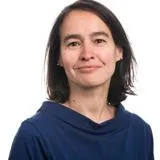We applied because colon cancer, particularly in younger adults, is a growing problem. Our range of multidisciplinary skills can play an important role, particularly with regards to nutrition and the gut microbiome. People with rare and early cancers don’t get as much research attention, so this is a key opportunity to better understand the risk factors and how to improve prevention.
Professor Tim Spector, Director of TwinsUK at King’s College London and scientific co-founder at ZOE
06 March 2024
Two teams awarded Cancer Grand Challenges £20m funding
Two teams from King’s have been awarded funding to take on some of cancer’s toughest challenges.

Teams will receive up to £20m in funding by Cancer Grand Challenges, a global cancer research initiative co-founded by Cancer Research UK and the National Cancer Institute in the US, to advance progress in four areas: Cancer inequities, early-onset cancers, solid tumours in children and T-cell receptors. Five teams have been awarded £100m in this year's funding.
Team PROSPECT will study factors contributing to early-onset colorectal cancer by analysing samples from diverse populations worldwide. They will look at known risk factors such as obesity and poor diet and new risk factors including environmental and social factors. In laboratory experiments, the scientists will investigate how these factors lead to cell changes linked to early-onset colorectal cancer.
The UK arm, led by Professor Tim Spector in the School of Life Course & Population Sciences, will combine research efforts from TwinsUK, the biggest adult twin registry in the UK based at King’s, and ZOE, the personalised nutrition company, to meet this challenge. Using data from TwinsUK and ZOE, scientists hope to determine the causal factors for early-onset colorectal cancer and understand how diet can be used to reduce and potentially reverse risk factors. The team will also conduct UK- and Indian-based trials of dietary interventions.
Although recent decades have seen a decrease in the overall incidence of colorectal cancer, there has been an alarming rise in the number of cases diagnosed in people under 50 years of age (early-onset colorectal cancer) in multiple countries across the world. Research suggests that this risk is increasing with each new generation and is likely linked to exposures in early life and throughout an individual’s lifetime that are specific to their birth cohort.
Dr Jordana Bell, from King’s College London said: “The unique data and planned intervention trial in the TwinsUK cohort will help characterise biological mechanisms underlying risk for developing early-onset colorectal cancer. Through identifying these mechanisms, we will be one step closer to treating and preventing this disease.”
Dr Sarah Berry, from King’s College London and chief scientist at ZOE, said: “The large-scale community experiment component of this research will explore the real-life application of dietary advice to reduce colorectal cancer risk in a way that hasn’t been done before.”
Meanwhile, Team SAMBAI, will establish the SAMBAI Biobank and Data Repository for Cancer Equity Research, a groundbreaking resource focused on breast, prostate and pancreatic cancer in individuals of African descent. Their goal is to create a comprehensive measurement of social, environmental, genetic and immunological factors influencing critical inequities in cancer incidence and mortality for underserved populations.
There is a growing recognition of the impact of environmental exposures and ancestry-related factors on tumor biology. However, our understanding is not yet comprehensive enough to make a significant impact on improving outcomes for ethnic minorities.
Dr Sheeba Irshad, Comprehensive Cancer Centre ·
She added: "The Cancer Grand Challenge offers a platform for the global community to unite and address an unmet clinical need, aiming to bring about a tangible transformation in addressing ethnic disparities related to cancer.”
PROSPECT team is funded by Cancer Research UK, the National Cancer Institute, the Bowelbabe Fund for Cancer Research UK and Institut National Du Cancer through Cancer Grand Challenges.
For more information on teams, team members and their approach to tackling these challenges, visit https://cancergrandchallenges.org/.



